#Richard Hoggart
Explore tagged Tumblr posts
Text

#1970s#paperback#non fiction#textbook#pelican books#uk#literacy#richard hoggart#penguin books#vintage graphic design
16 notes
·
View notes
Text

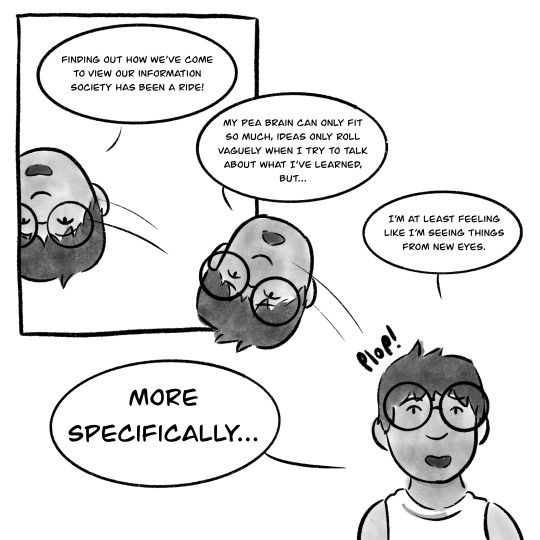
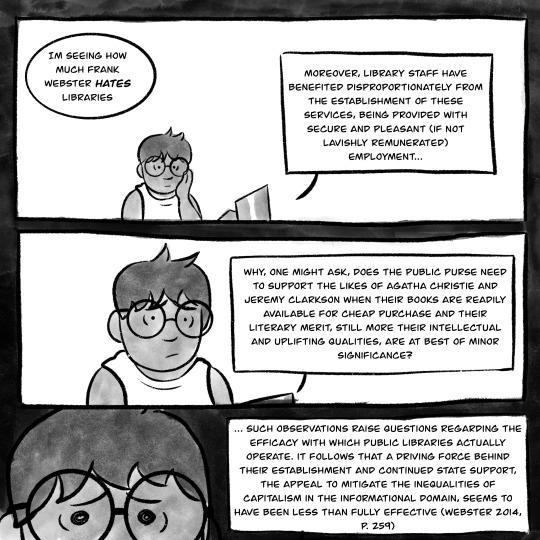

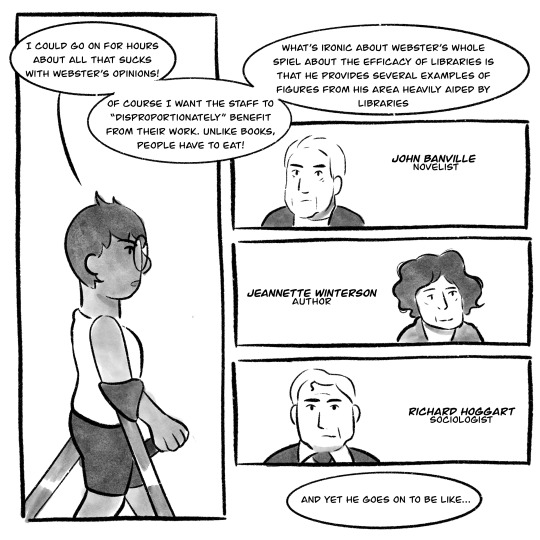

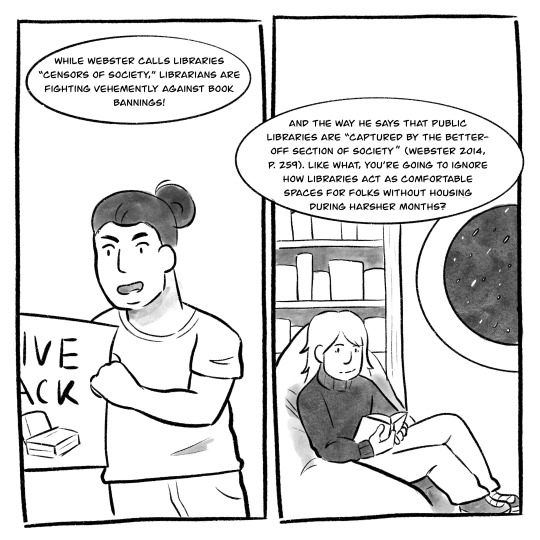

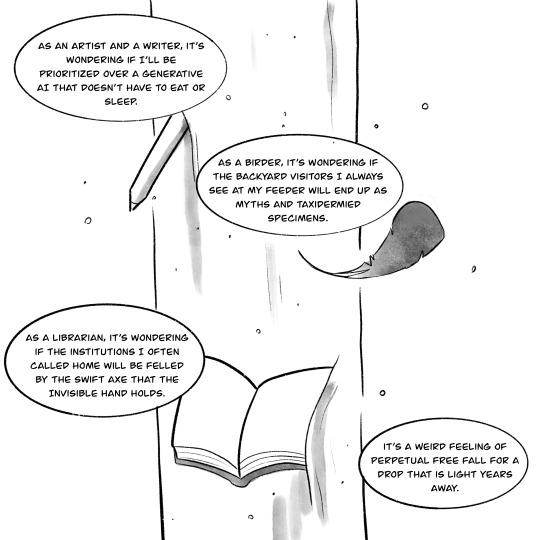

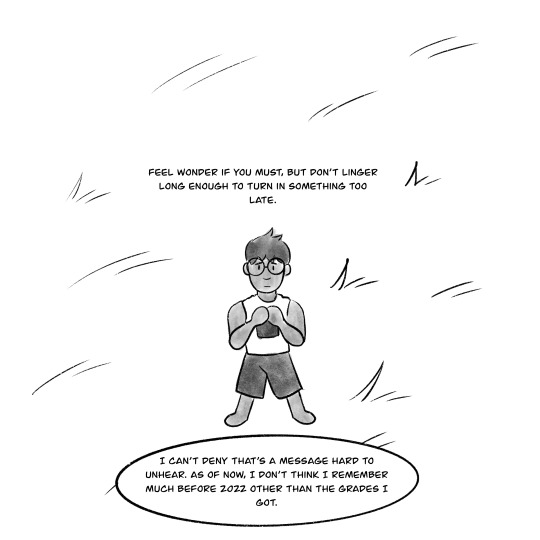
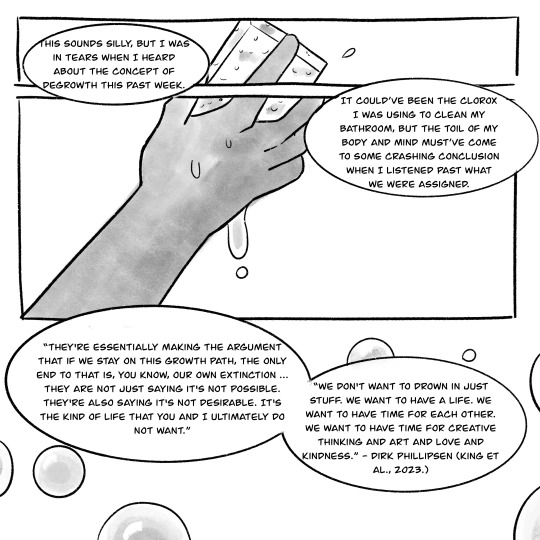
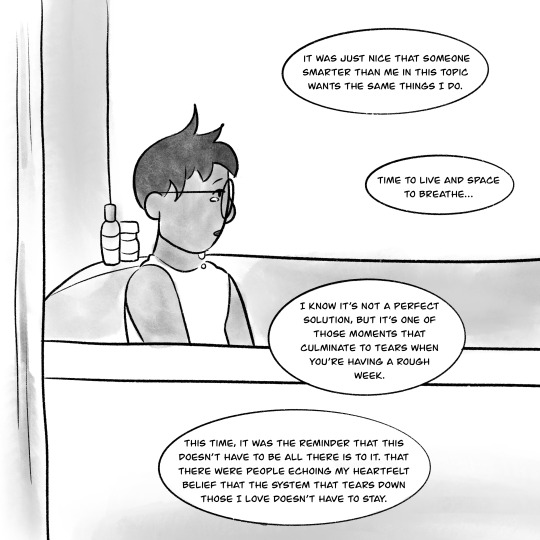
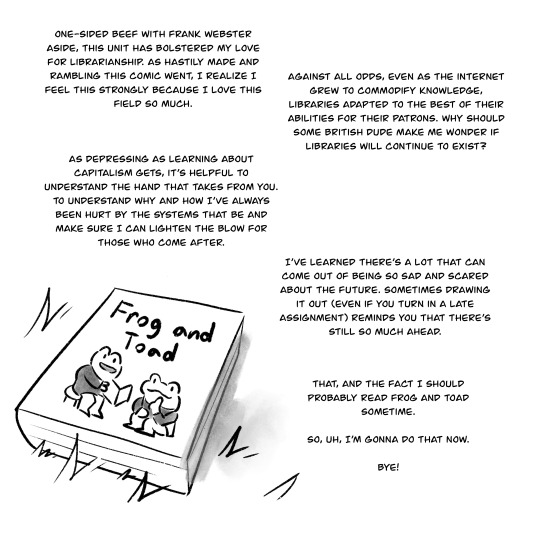

Worth Existing (or, Frank Webster Gives Keegan An Existential Crisis)
been busy this semester, but have a reflection comic I got away with making for an information history class! it's rambling, but i had some fun digesting my thoughts.
image descriptions from alt: The title page contains the title “Worth Existing, or: Frank Webster gives Keegan an existential crisis.” In front of a mirror, Keegan stands with their back facing the viewer as a reflection of them as a librarian looks back worriedly.
Page 1 features a sequential cartoonish sequence of Keegan’s head rolling and landing on his shoulders. He says: “Finding out how we’ve come to view our information society has been a ride. My pea brain can only fit so much, ideas only roll vaguely when I try to talk about what I’ve learned, but I’m at least seeing things from new eyes. More specifically…”
Dialogue continues on Page 2, 3 panels sequentially zoom in on a horrified Keegan. She says, “I’m seeing how much Frank Webster hates libraries.” The quote from the book she’s reading is as follows: “Moreover, library staff have benefited disproportionately from the establishment of these services, being provided with secure and pleasant (if not lavishly remunerated) employment. Why, one might ask, does the public purse need to support the likes of Agatha Christie and Jeremy Clarkson when their books are readily available for cheap purchase and their literary merit, still more their intellectual and uplifting qualities, are at best of minor significance. Such observations raise questions regarding the efficacy with which public libraries actually operate. It follows that a driving force behind their establishment and continued state support, the appeal to mitigate the inequalities of capitalism in the informational domain, seems to have been less than fully effective.” End quote.
Page 3 has Keegan looking with hands clasped, paused. They then look at the camera, asking “Did the dude just insult Agatha Christie?” The bottom has them lying on their bed, looking up at the ceiling in thought, saying “There’s something that just bugged me ever since I read that chapter. I never really understood the theory we talked about in class, it’s a skill I’m working on, but the weird beef he has with libraries at least gave me a vibe on ‘Hayekian Neoliberalism.’ And also how weird it is that capitalism got so far into deciding what’s worth existing. If the thing I wanna do with my life is worth existing.”
On Page 4, Keegan walks with his crutches as the dialogue continues. “I could go on for hours about all that sucks with Webster’s opinions! Of course I want the staff to ‘disproportionately’ benefit from their work. Unlike books, people have to eat! What’s ironic about Webster’s whole spiel about the efficacy of libraries is that he provides several examples of figures from his area heavily aided by libraries. Panels feature novelist John Banville, author Jeannette Winterson, and sociologist Richard Hoggart. Keegan continues and says, “And yet he goes on to be like…”
Page 5, a sock puppet speaks angrily: “People are getting free books and are hurting the poor bookseller! Libraries are stupid because it doesn’t miraculously fix the inequalities of capitalism!” To the side, the text says “Artist’s exaggeration. Don’t take this seriously.” Bottom panel contains Keegan pointing with her thumb at Frank Webster’s Wikipedia page. She says, “I wouldn’t be so hung up if this was some random guy, but considering this guy is so largely quoted and touted in my field of information sciences? Ouch obviously doesn’t cut how much all that stung.”
Page 6 contains an Asian man with a bun protesting banned books. The next panel contains a white woman with a turtleneck reading in a library as a winter storm brews outside. Keegan off-screen says, “While Webster calls libraries ‘censors of society,’ librarians are fighting vehemently against book bannings! And the way he says that public libraries are ‘captured by the better-off section of society?’ Like what, you’re going to ignore how libraries act as comfortable spaces for folks without housing during harsher months?”
On Page 7 a gavel bangs on a panel. “As if that’s not enough, publishers are suing libraries for distributing e-books, calling them ‘direct economic competitors’ when, if anything, they often support these publishers and their authors by buying multiple copies, hosting events and collaborating with local businesses.” As an example, the comic features a scene of a Black woman in a cardigan talking to a white cashier with a shaved head. She says to them, “I just read this at my library earlier and just needed to get my own copy! Can’t believe it took me this long to discover this author!” A panel below, a pair of hands scoops sand and watches it flow from their fingers. Keegan says, “I don’t know. Even in good company, it sometimes feels like the future is slipping through my fingers.”
Page 8 is a pillar of falling sand. Embedded in it is an Apple pencil, a floating feather, and a book. Keegan narrates, “As an artist and a writer, it’s wondering if I’ll be prioritized over a generative AI that doesn’t have to eat or sleep. As a birder, it’s wondering if the backyard visitors I always see at my feeder will end up as myths and taxidermied specimens. As a librarian, it’s wondering if the institutions I often called home will be felled by the swift axe that the invisible hand holds. It’s a weird feeling of perpetual free fall for a drop that is light years away.”
Page 9, Keegan is holding a book to the sky as they read it. They narrate “Learning is a language I’ve always used to make sense of the thoughts I’ve had swirling in my brain. Finding out ‘information capitalism’ was a thing was like learning about the leash that has pulled at my throat since I entered the schooling system. I am learning because I am not a person, but a tool to be put to a trade. The world around me whispers in my ear…”
“Feel wonder if you must, but don’t linger long enough to turn in something too late.” On page 10, Keegan lies on a grassy field looking up with the book on his chest. He narrates, “I can’t deny that’s a message hard to unhear. As of now, I don’t think I remember much before 2022 other than the grades I got.”
On page 11, a hand wipes a bathroom wall with a sponge. The bottom of the page is filled with floating bubbles. Keegan narrates, “This sounds silly, but I was in tears when I heard about the concept of degrowth this past week. It could’ve been the clorox I was using to clean my bathroom, but the toil of my body and mind must’ve come to some crashing conclusion when I listened past what we were assigned.” The quote goes, They’re essentially making the argument that if we stay on this growth path, the only end to that is, you know, our own extinction. They are not just saying it’s not possible. They’re also saying it’s not desirable. It’s the kind of life that you and I ultimately do not want. We don’t want to drown in just stuff. We want to have a life. We want to have time for each other. We want to have time for creative thinking and art and love and kindness.” The quote ends. It comes from Vox’s Blame Capitalism: Degrowing Pains and is spoken by Dirk Phillipsen.
On page 12, Keegan sits in the bathtub with a few tears. Narration goes, “It was just nice that someone smarter than me in this topic wants the same things I do. Time to live and space to breathe. I know it’s not a perfect solution, but it’s one of those moments that culminate to tears when you’re having a rough week. This time, it was the reminder that this doesn’t have to be all there is to it. That there were people echoing my heartfelt belief that the system that tears down those I love doesn’t have to stay.
Page 13. A frog and toad book. “One-sided beef with Frank Webster aside, this unit has bolstered my love for librarianship. As hastily made and rambling this comic went, I realize I feel this strongly because I love this field so much. Against all odds, even as the internet grew to commodify knowledge, libraries adapted to the best of their abilities for their patrons. Why should some British dude make me wonder if libraries will continue to exist? As depressing as learning about capitalism gets, it’s helpful to understand the hand that takes from you. To understand why and how I’ve always been hurt by the systems that be and make sure I can lighten the blow for those who come after. I’ve learned there’s a lot that can come out of being so sad and scared about the future. Sometimes drawing it out (even if you turn in a late assignment) reminds you that there’s still so much ahead. That, and the fact I should probably read Frog and Toad sometime. So, uh, I’m gonna do that now. Bye!"
The references page lists several sources: Frank Webster’s “Theories of the Information Society.” An article by Brewster Kahle called, “The US library system, once the best in the world, faces death by a thousand cuts.” An article by Rachel Kramer Bussel called, “How Libraries Help Authors Boost Book Sales.” And a podcast episode from Vox’s Today Explained hosted by Noel King, titled “Blame Capitalism: Degrowing Pains.” end descriptions.
#art#artists on tumblr#comic#information science#academia#studyblr#library#libraries#library science#image described#image description in alt#accessible art#long post
66 notes
·
View notes
Note
It Happened To Me: I was jumpscared by David Tennant when I least expected it. I started reading the Uses of Literacy (1957) by the British sociologist Richard Hoggart, and in the foreword written by his son in 2009 he notes that David Tennant had portrayed his father in the 2006 BBC made for TV movie The Chatterly Affair, with his “Doctor Who sideburns.” You can watch the whole thing on youtube, and in 2008 someone had already uploaded just David Tennant’s scene.
Yet another David Tennant project I’ve never heard of. Excellent
14 notes
·
View notes
Text
the major bummer about Richard Hoggart's Uses of Literacy is his over reliance on composites. I understand why a guy trained as an English professor isn't doing an ethnographic study but I would kill for a description of some people instead of a grab bag of phrases taken as a text
#minor bummer is his insensible snobbery about comics and... syncopation of all things#Adorno too has a crack somewhere about syncopation. Jazz must have really done a number on European intellectuals
2 notes
·
View notes
Text

Stuart McPhail Hall (February 3, 1932 – February 10, 2014) was a Jamaican-born British Marxist sociologist, cultural theorist, and political activist. He, along with Richard Hoggart and Raymond Williams, was one of the founding figures of the school of thought that is now known as British Cultural Studies or The Birmingham School of Cultural Studies.
He attended Jamaica College, receiving an education modeled after the British school system.
He won a Rhodes Scholarship to Merton College at the University of Oxford, where he studied English and obtained an MA, becoming part of the Windrush generation, the first large-scale emigration of West Indians, as that community was then known..” He began a Ph.D. on Henry James at Oxford but, galvanized particularly by the 1956 Soviet invasion of Hungary, he abandoned this to focus on his political work.
He was the founder of the influential New Left Review. At Hoggart’s invitation, he joined the Centre for Contemporary Cultural Studies at Birmingham University. He took over from Hoggart as acting director of the Centre in 1968, became its director in 1972, and remained there until 1979. While at the Centre, he is credited with playing a role in expanding the scope of cultural studies to deal with race and gender, and with helping to incorporate new ideas derived from the work of French theorists like Michel Foucault.
He left the center in 1979 to become a professor of sociology at the Open University. He was President of the British Sociological Association. He retired from the Open University and was a professor emeritus. British newspaper The Observer called him “one of the country’s leading cultural theorists���. He was involved in the Black Arts Movement. Movie directors such as John Akomfrah and Isaac Julien see him as one of their heroes. #africanhistory365 #africanexcellence
1 note
·
View note
Text
On this day in Wikipedia: Saturday, 10th February
Welcome, 欢迎 (huānyíng), benvingut, sveiki 🤗 What does @Wikipedia say about 10th February through the years 🏛️📜🗓️?

10th February 2023 🗓️ : Death - AKA (rapper) AKA, South African rapper (b. 1988) "Kiernan Jarryd Forbes (28 January 1988 – 10 February 2023), known professionally as AKA, was a South African rapper, record producer, and businessman. Born in Cape Town and raised in Johannesburg, Forbes gained recognition after releasing his single "Victory Lap" from his debut studio album, Altar..."

Image licensed under CC BY-SA 3.0? by Ameyaw Debrah
10th February 2019 🗓️ : Death - Jan-Michael Vincent Jan-Michael Vincent, American actor (b. 1944) "Jan-Michael Vincent (July 15, 1944 – February 10, 2019) was an American actor known for portraying helicopter pilot Stringfellow Hawke in the TV series Airwolf (1984–1987) and the protagonist, Matt Johnson, in the 1978 film Big Wednesday. He also starred as Byron Henry in The Winds of War...."

Image licensed under CC BY 2.0? by Patty Mooney from San Diego, USA
10th February 2014 🗓️ : Death - Stuart Hall (cultural theorist) Stuart Hall, Jamaican-English sociologist and theorist (b. 1932) "Stuart Henry McPhail Hall (3 February 1932 – 10 February 2014) was a Jamaican-born British Marxist sociologist, cultural theorist, and political activist. Hall — along with Richard Hoggart and Raymond Williams — was one of the founding figures of the school of thought known as British Cultural..."

Image licensed under FAL? by Unknown authorUnknown author
10th February 1974 🗓️ : Birth - Elizabeth Banks Elizabeth Banks, American actress "Elizabeth Banks (born Elizabeth Irene Mitchell; February 10, 1974) is an American actress and filmmaker. She is known for playing chaperone Effie Trinket in The Hunger Games film series (2012–2015) and an ICCA commentator in the Pitch Perfect film series (2012–2017). She made her directorial film..."

Image licensed under CC BY-SA 3.0? by Gage Skidmore
10th February 1924 🗓️ : Birth - Bud Poile Bud Poile, Canadian ice hockey player and coach (d. 2005) "Norman Robert "Bud" Poile (February 10, 1924 – January 4, 2005) was a professional ice hockey player, coach, general manager, and league executive. Bud is the brother of Don Poile, and the father of David Poile...."

Image by Unknown authorUnknown author
10th February 1824 🗓️ : Birth - Samuel Plimsoll Samuel Plimsoll, English merchant and politician (d. 1898) "Samuel Plimsoll (10 February 1824 – 3 June 1898) was a British politician and social reformer, now best remembered for having devised the Plimsoll line (a line on a ship's hull indicating the maximum safe draught, and therefore the minimum freeboard for the vessel in various operating conditions)...."

Image
10th February 🗓️ : Holiday - Kurdish Authors Union Day (Iraqi Kurdistan) "This is a list of public holidays in Iraq. ..."
0 notes
Quote
They are all doing what working-class people always do, wherever they find themselves and however unpromising their situation may appear; they are exercising their strong traditional urge to make life intensely human, to humanize it in spite of everything and so to make it, not simply bearable, but positively interesting. To some extent this is true of most people in any class, but is an attitude particularly encouraged by the nature of working-class life. Working-class people are only rarely interested in theories of movements. They do not usually think of their lives as leading to an improvement in status or to some financial goal. They are enormously interested in people: they have the novelist's fascination with individual behaviour, with relationships though not so as to put them into a pattern, but for their own sake. 'Isn't she queer?'; "Fancy saying a thing like that!' "What do you think she meant by that?' they say; even the simplest anecdote is told dramatically, with a wealth of rhetorical questions, supplementary illustrations, significant pauses, and alternations of pitch.
Richard Hoggart, The Uses of Literacy, p.106.
1 note
·
View note
Text
Duo with Marjolaine Charbin
Tuesday 16th May
Music 7-9pm Doors 6.45pm Entry £8 / £10 (free to Goldsmiths students + staff) Richard Hoggart Building, Room RHB167, Goldsmiths, University of London, SE14 6NW
Grundik Kasyansky (feedback synthesizer), Marjolaine Charbin (piano) Isidora Edwards (cello), Oren Marshall (tuba). Kate Ryder (piano), Adam Bohman (amplified objects + strings),Roger Redgate (violin&fx), Adrian Northover (soprano sax).
0 notes
Photo


Every year around this time I seem to return to Les Back’s brilliant book Academic Diary – I especially love that Hoggart quote, ah 🤍
#studyblr#studygram#books#book#b#bookblr#booklr#bookstagram#university#academic diary#light academia#les back#goldsmiths#goldsmiths uol#uol#university of london#london#richard hoggart#hoggart#galina
717 notes
·
View notes
Text
La France a grandi à l'ombre d'un nuage massé au-dessus de la Normandie : la terrible Angleterre, l'embryon du plus puissant empire mondial, qui règne par les armes et l'argent, mais aussi par les arts, le sport, la langue, le vêtement... Une émission de garde, cadeau de Noël 2021!
Le fusil & le chéquier.
Franco-Normands contre Anglo-Saxons.
Esprit participatif pour financer et relayer.
Génie messianique des pionniers anglo-saxons.
L'Angleterre, un prédateur de la France.
Contre-culture devient culture : technique de la captation.
Langue, peinture, vêtement, musique, repas et sport.
Londres: les docks, la banque, la rue.
Primauté de l'influence française.
Fabriqué en France! Idées de cadeaux.
Entretien avec un gauchiste : Pierrick, antifa breton.
#erfm#Éloquence du Vulgaire#Lounès Darbois#Charmes et pièges de l'Angleterre#Louis-Ferdinand Céline#Everton#London#Chelsea#Hastings#Jean Rouzaud#Richard Hoggart#Gien#Paul Morand#Huysmans#Come on Eileen
20 notes
·
View notes
Photo

check out this book
a fascinating study on the english language and how it’s uuuuused
0 notes
Quote
Orwell notes with contempt how in 1937 it was fashionable to say that class divisions were fading in Britain. Twenty years later I published a book which made similar points, and was told by some reviewers that I was grievously mistaken, that class feeling was virtually dead. Thirty more years on and the same things are being said. Class distinctions do not die; they merely learn new ways of expressing themselves. Orwell’s stance in this matter is completely up to date. Each decade we shiftily declare we have buried class; each decade the coffin stays empty.
Richard Hoggart, introduction to George Orwell’s The Road to Wigan Pier (Penguin, 1989), p. vii.
56 notes
·
View notes
Photo

Stuart McPhail Hall (February 3, 1932 – February 10, 2014) was a Jamaican-born British Marxist sociologist, cultural theorist, and political activist. He, along with Richard Hoggart and Raymond Williams, was one of the founding figures of the school of thought that is now known as British Cultural Studies or The Birmingham School of Cultural Studies. He was the founder of the influential New Left Review. At Hoggart's invitation, he joined the Centre for Contemporary Cultural Studies at Birmingham University. He took over from Hoggart as acting director of the Centre in 1968, became its director in 1972, and remained there until 1979. While at the Centre, he is credited with playing a role in expanding the scope of cultural studies to deal with race and gender, and with helping to incorporate new ideas derived from the work of French theorists like Michel Foucault. He left the center in 1979 to become a professor of sociology at the Open University. He was President of the British Sociological Association. He retired from the Open University and was a professor emeritus. British newspaper The Observer called him "one of the country's leading cultural theorists". He was involved in the Black Arts Movement. Movie directors such as John Akomfrah and Isaac Julien see him as one of their heroes. #africanhistory365 #africanexcellence https://www.instagram.com/p/CoMzpBprRYp/?igshid=NGJjMDIxMWI=
0 notes
Text
Entertaining the masses: The Uses of Literacy 60 years on
How Richard Hoggart's poor upbringing informed his classic book.
One of the sharpest testimonies to Richard Hoggart’s status as a cultural pundit turns up in the Beatles film Magical Mystery Tour (1967). It arrives at the moment when the coach party rolls in to London for a stopover at the somewhat unlikely locale of the Raymond Revuebar in Brewer Street, Soho.
Here, with John, Paul, George and Ringo leering from the front row, they are entertained by those archetypal Sixties scene-swellers, the Bonzo Dog Doo-Dah Band (later joined by one of Paul Raymond’s pouting artistes), whose singer, Vivian Stanshall, belts out an Elvis-style pastiche called “Death Cab for Cutie”. This, as any reader of The Uses of Literacy will straight away twig, is one of the gangster film titles fabricated by Hoggart in his critique of the mass-cultural diaspora hastening across the Atlantic to ruin the morals of our nation’s young.
(via Entertaining the masses: The Uses of Literacy 60 years on)
2 notes
·
View notes
Photo

The Uses of Literacy by Richard Hoggart with detail from a L. S. Lowry painting on the cover.
6 notes
·
View notes
Photo

https://archive.org/details/2014RitualesDeResistencia/mode/2up
Rituales de resistencia es una de las obras fundacionales del Centro de Estudios Culturales Contemporáneos (CCCS) de la Universidad de Birmingham y, por ende, de los Cultural Studies. Frente a la prensa y los políticos conservadores, incapaces de ver en las culturas juveniles de postguerra más que espectáculo o violencia, Stuart Hall y sus compañeros desarrollaron un análisis histórico que conjugaba la atención a las clases con la agencia de sus protagonistas (mods, skinheads, rastas, rudies, hippies). En un momento de acelerados cambios en la estructura económica así como de consolidación de la sociedad de masas, los investigadores del CCCS acompañaron a los jóvenes británicos para tratar de entender los significados de sus novedosos «estilos», así como para resaltar las formas culturales de resistencia implícitas en sus patrones de sociabilidad. En el cruce de lo macro y lo micro, de los cambios objetivos y de los deseos subjetivos, fueron capaces de leer una época que dejaba atrás la homogeneidad de la clase trabajadora pero que seguía buscando imperiosamente nuevas formas de comunidad e identidad. El CCCS de la Universidad de Birmingham fue fundado por Richard Hoggart en 1964. La perspectiva interdisciplinar del centro conjugaba el marxismo, la teoría crítica, el postestructura- lismo, la etnografía y el análisis de los medios de comunicación. El reconocido sociólogo antillano Stuart Hall fue nombrado director del centro en 1968. Bajo su dirección se desarrollaron los estudios considerados canónicos de los Cultural Studies: Policing The Crisis (1978) y The Empire Strikes Back (1982), así como el clásico Rituales de resistencia (1975).
2 notes
·
View notes